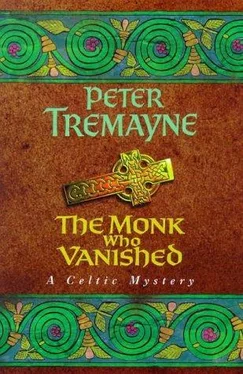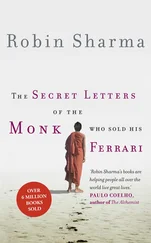Peter Tremayne - The Monk Who Vanished
Здесь есть возможность читать онлайн «Peter Tremayne - The Monk Who Vanished» весь текст электронной книги совершенно бесплатно (целиком полную версию без сокращений). В некоторых случаях можно слушать аудио, скачать через торрент в формате fb2 и присутствует краткое содержание. Жанр: Исторический детектив, на английском языке. Описание произведения, (предисловие) а так же отзывы посетителей доступны на портале библиотеки ЛибКат.
- Название:The Monk Who Vanished
- Автор:
- Жанр:
- Год:неизвестен
- ISBN:нет данных
- Рейтинг книги:3 / 5. Голосов: 1
-
Избранное:Добавить в избранное
- Отзывы:
-
Ваша оценка:
- 60
- 1
- 2
- 3
- 4
- 5
The Monk Who Vanished: краткое содержание, описание и аннотация
Предлагаем к чтению аннотацию, описание, краткое содержание или предисловие (зависит от того, что написал сам автор книги «The Monk Who Vanished»). Если вы не нашли необходимую информацию о книге — напишите в комментариях, мы постараемся отыскать её.
The Monk Who Vanished — читать онлайн бесплатно полную книгу (весь текст) целиком
Ниже представлен текст книги, разбитый по страницам. Система сохранения места последней прочитанной страницы, позволяет с удобством читать онлайн бесплатно книгу «The Monk Who Vanished», без необходимости каждый раз заново искать на чём Вы остановились. Поставьте закладку, и сможете в любой момент перейти на страницу, на которой закончили чтение.
Интервал:
Закладка:
Ségdae expelled the air from his lungs in an almost violent hiss. ‘Mochta was originally from the Clan Brasil in Ulaidh,’ he began.
‘A northern kingdom,’ Fidelma interjected for Eadulf’s benefit.
‘He had that same distinctive tattoo on his left forearm.’
Fidelma was silent for a moment as she considered the matter.
‘Then our mystery merely deepens, Segdae,’ observed Fidelma at last. Ignoring their puzzled looks, she went on. ‘When did you last see this Brother Mochta?’
‘I saw him last evening at Vespers.’
Vespers was the sixth canonical hour of the breviary of the Church, sung by the religious when Vesper the evening star rose in the sky.
‘Did he often leave the abbey?’ Fidelma pressed.
Ségdae shook his head. ‘To my knowledge, he hardly ever left the abbey since he came here to be our scriptor ten years ago.’
Eadulf raised his eyebrows and glanced meaningfully at Fidelma. ‘Did you say that he was your scriptor?’ he asked quickly.
Ségdae made an affirmative gesture. ‘He came here to work on our Annals and then became Keeper of the Holy Relics.’
‘Surely, in view of the value and significance of these relics,’ Eadulfbegan, ‘it was strange to appoint a man from another kingdom as their keeper?’
‘Brother Mochta was a pious and conscientious man who fulfilled his religious duties well and without thought of any particularism. He was devoted to this abbey and to his adopted land.’
‘Until now,’ Eadulf observed quietly.
‘He has been with us ten years, six of which were as Keeper of the Relics. Are you claiming that he stole the Relics and went to Cashel last night to kill King Colgú? It is impossible to believe.’
‘Yet if he was as you describe, even to the tattoo of the buzzard on his left forearm, then his body lies dead in Cashel, cut down while trying to flee from the scene of the assassination,’ replied Eadulf.
Abbot Ségdae hunched his shoulders in anguish. ‘But how is his bloodied and disorderly cell to be explained? Brother Madagan, my steward, and I immediately thought that Mochta had been attacked and wounded by whoever stole the Relics.’
Fidelma looked thoughtful. ‘That is a mystery that we must solve. In the mean time, it appears that we have a name to one of our dead assassins in Cashel.’
‘But an even greater mystery than before,’ sighed Eadulf. ‘If this Brother Mochta stole the relics and — ’
Fidelma interrupted him, reaching into her marsupium, the small leather purse at her waist, and holding out a piece of paper to the abbot. ‘I want you to see if you can identify this, Segdae.’ On the paper was the sketch of the crucifix which she had asked Brother Conchobar to make. She flattened the paper so that the abbot could see it.
The abbot reached for it in excitement.
‘What does this mean?’ he demanded as he gazed on the drawing.
‘Do you recognise it?’ prompted Fidelma.
‘Of course.’
‘Then tell us what it is.’
‘It is one of the sacred Relics of Ailbe. He was ordained Bishop in Rome, so the story goes. It was said the Bishop of Rome, Zosimus the Greek, presented him with this crucifix made by the finest craftsmen of Constantinople. It is of silver with five great emeralds. Who made this sketch and why?’
Carefully, Fidelma refolded the sketch and replaced it in her marsupium . ‘The cross was found on the body of the rotund assassin after he was slain by Gionga, the captain of the guard of the Uí Fidgente.’
Eadulf slapped his thigh with satisfaction. ‘Well, here is a mystery solved. Your Brother Mochta stole the Relics and then went to assassinate Colgú and Donennach.’
‘Is the crucifix still safe?’ Segdae asked anxiously.
‘It is being held at Cashel as evidence for the hearing.’
Abbot Ségdae sighed deeply. ‘Then at least one item of the Holy Relics is safe. But where are the rest? Did you find them?’
‘No.’
‘Then where are they?’ The abbot almost wailed in despair.
‘That we have to discover,’ asserted Fidelma. She drained her goblet and rose purposely. ‘Let me examine the chamber of Mochta. I presume that you have not disturbed it since your examination this morning?’
The abbot shook his head.,
‘All remains as we found it,’ he replied, also rising. ‘But I am still shocked and bewildered that such a man as Brother Mochta could have done this deed. He was such a quiet man, not given to speaking out even on his own behalf.’
‘Atlissima quaeque flumina minimo sono labi,’ intoned Eadulf. Fidelma wrinkled her nose. ‘Perhaps that is true. The deepest rivers flow with the least sound. Usually, however, they leave some mark of their passage and that we must discover. Take us to Brother Mochta’s cell, Ségdae.’
Abbot Ségdae took up a lamp and led them from the room. As they passed down the corridors they could hear a faint noise rising from a distance.
‘The brothers are at their clais-cetul ,’ explained Abbot Ségdae as he saw Eadulf pause and listen.
It was a new phrase to Eadulf.
‘They sing in a choir,’ explained Segdae. ‘The term means the harmonies of the voice. Here we sing the Psalms in the manner of the Gauls, who are our cousins, rather than in the manner of the Roman classis .’
Eadulf became aware of a strange acoustical effect in this corner of the abbey. The voices of the chanting religious carried clearly from the chapel on the far side of the cloisters. He could even hear the words distinctly.
Regem, regum, rogamus
in nostris sermonibus,
anacht Noe a luchtlach
Diluui temporibus …
‘We beseech in both our languages,’ translated Fidelma reflectively, ‘the King of Kings who protected Noah with his crew in the days of the Flood …’
‘I have not heard the like before,’ Eadulf admitted. ‘This joining of Latin and Irish in a verse is quite strange.’
‘It is one of the songs of Colmán moccu Cluasaif, the lector of Cork. He composed it two years ago when we were under threat from the terrible Yellow Plague,’ explained Segdae.
They stood listening for a moment, for there was something hypnotic about the rising and falling of the chanting voices.
‘It is based, I think, on the prayer in the Breviary for the Commendation of the Soul,’ Fidelma hazarded.
‘That is exactly what it is, Fidelma,’ Segdae confirmed with appreciation. ‘It is good to see you are not neglecting your religious studies in spite of your growing reputation as a dálaigh.’
‘Which brings us back to why we are here, Ségdae,’ Fidelma added seriously.
The abbot continued to lead the way along the dark corridors of the abbey. Torches gave a shadowy, dancing light from their metal burners along the stone walls.
Darkness had fallen now and apart from the pungent smell of the torches and their deceptive lighting, the abbey was shrouded in darkness.
‘Perhaps it would have been wise to wait until morning,’ muttered Eadulf, glancing around. ‘I do not think we will be able to observe much in this light.’
‘Perhaps,’ agreed Fidelma. ‘It is true that artificial light can be treacherous but I want to have a cursory examination for the longer things are left the more likely they are to fall into disarray.’
They fell silent as they continued along the echoing corridors of the abbey and across the cloisters.
‘The wind is from the south-west again,’ muttered the abbot as the torches nearby flickered violently. He halted in front of a door and bent to open it, then stood aside, holding the lamp for them to enter.
Once inside the light fell across the disordered chamber.
Читать дальшеИнтервал:
Закладка:
Похожие книги на «The Monk Who Vanished»
Представляем Вашему вниманию похожие книги на «The Monk Who Vanished» списком для выбора. Мы отобрали схожую по названию и смыслу литературу в надежде предоставить читателям больше вариантов отыскать новые, интересные, ещё непрочитанные произведения.
Обсуждение, отзывы о книге «The Monk Who Vanished» и просто собственные мнения читателей. Оставьте ваши комментарии, напишите, что Вы думаете о произведении, его смысле или главных героях. Укажите что конкретно понравилось, а что нет, и почему Вы так считаете.












